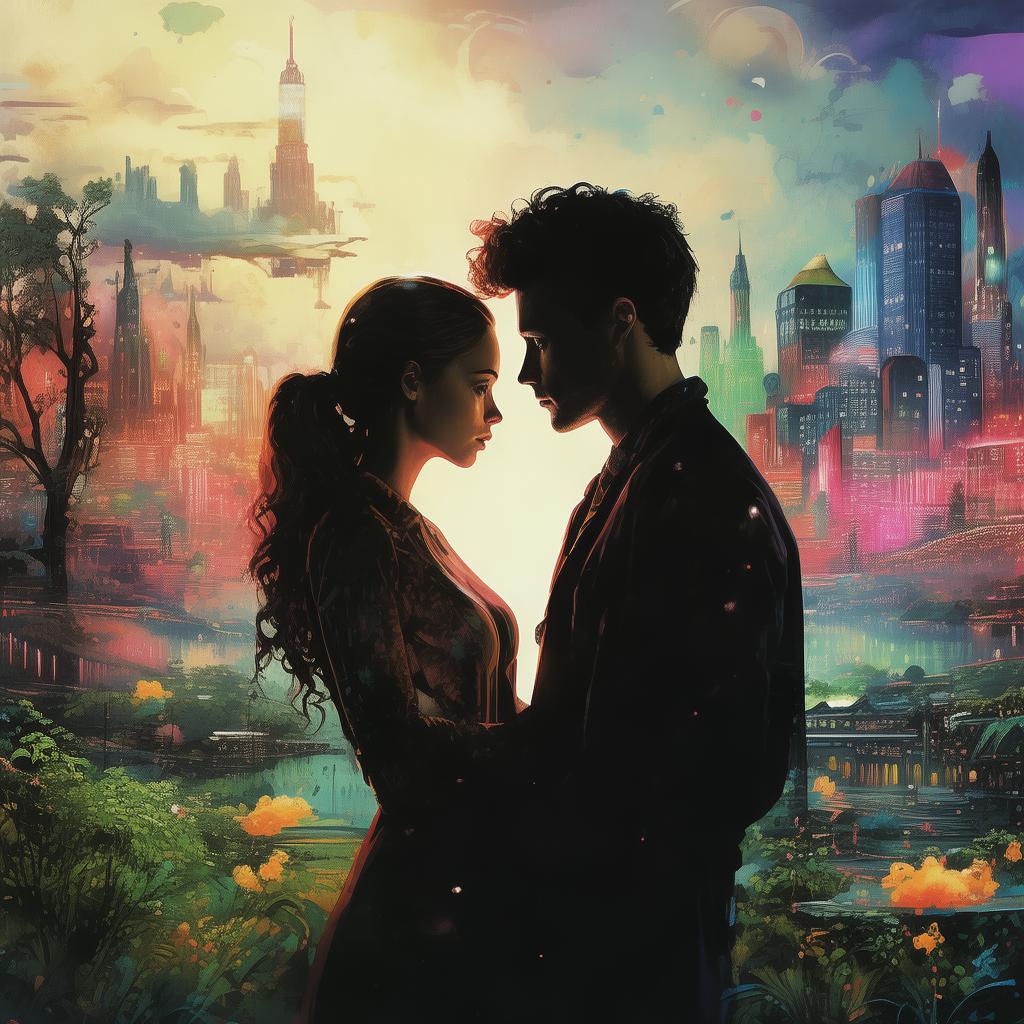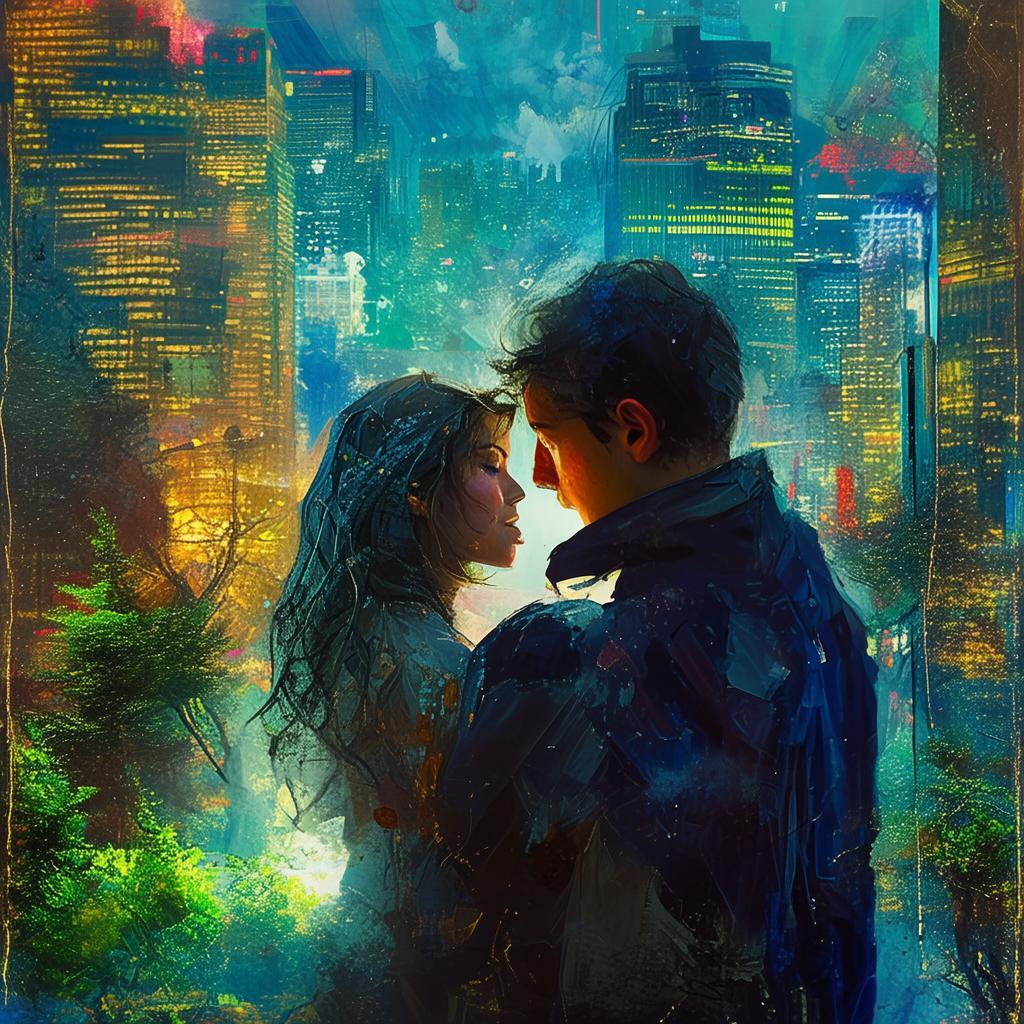Whispers of the Silver Screen: A Love Story in the Balance
In the heart of bustling Beijing, where the past and present intertwine, there was a cinema that had seen better days. Its neon sign flickered weakly in the night, casting a soft glow over the cobblestone street. Inside, the air was thick with the scent of old film reels and the faint hum of projector motors. This was the Beijing Cinema, a place where dreams took flight and reality was often blurred.
Li Wei, a young cinematographer, had grown up in this cinema, its walls adorned with faded movie posters of heroes and heroines. His father had been a projectionist here, and the cinema was the only world Li knew. It was also where he met Mei Lin, a woman whose eyes sparkled with the same love for film that he felt.
Mei Lin was a student of Chinese literature, her days filled with the weight of ancient texts and the beauty of poetry. Her nights, however, were spent in the cinema, where she found solace in the stories that played on the silver screen. It was there that she first saw Li Wei, his hands moving with the grace of a maestro, adjusting the focus of the camera.
Their love was a delicate balance, as fragile as the old film stock they handled. Li Wei was determined to make a film that would capture the essence of Beijing, a city that was rapidly changing. Mei Lin, on the other hand, wanted to preserve the city's past, its history etched into every brick and alley.
One evening, as they sat in the cinema's old wooden seats, Li Wei's eyes caught a glimpse of a mysterious film. It was a silent movie, its title in faded letters that seemed to whisper secrets of the past. The film spoke of a love story, one that was as much about the city as it was about the two people caught in its web.
Curiosity piqued, Li Wei decided to find the film. He spent days searching through the dusty archives, until he discovered it hidden away in a forgotten storage room. The film was a treasure, a relic of a bygone era, and it seemed to call out to him.
As Li Wei began to watch the film, he was transported back to another time, another place. He saw the love story unfold, a tale of passion and sacrifice that mirrored his own. The protagonist, a young woman, was torn between her love for the city and her desire to leave it behind. The man she loved was a filmmaker, much like Li Wei, who was determined to capture the city's soul on film.
The film's story began to weave itself into Li Wei's own life. He found himself drawn to the young woman's struggle, her love for the city that was so much like his own. Mei Lin noticed the change in him, the way his eyes sparkled with a newfound purpose.

The two of them began to work on the film together, a project that seemed to have a life of its own. They spent nights editing, their fingers dancing over the keys of the computer, their hearts pounding with the rhythm of the story they were creating.
As they delved deeper into the film's narrative, they discovered that the story was not just a reflection of their own love, but a mirror to the city itself. Beijing was changing, becoming a modern metropolis, but it was also losing its soul. The film they were making was their way of fighting to preserve what was being lost.
The climax of their project came when they decided to screen the film at the Beijing Cinema, the very place where their love had begun. The night of the screening was electric, the air thick with anticipation. The audience was a mix of old friends and curious strangers, all drawn to the tale of love and loss that had unfolded before them.
As the film reached its climax, the young woman made a decision that would change her life forever. She chose to stay in the city, to fight for its future, just as Li Wei and Mei Lin were doing with their film. The audience erupted into applause, their emotions riding the waves of the story they had just witnessed.
The film was a success, not just as a piece of art, but as a love letter to the city of Beijing. It sparked a conversation about the importance of preserving the past while embracing the future. Li Wei and Mei Lin had found their voice, their love story had become a part of the city's story.
In the end, the Beijing Cinema was more than just a place where dreams took flight. It was a sanctuary, a place where love and art intertwined, where the past and present danced together in a delicate balance. And in that balance, Li Wei and Mei Lin found their place, their love story forever intertwined with the city that had given them so much.
As the lights came up, Li Wei and Mei Lin sat together in the darkened theater, their hands entwined. They had made a film, but more importantly, they had made a connection, a bond that was as strong as the city that had witnessed their love story in the balance.
✨ Original Statement ✨
All articles published on this website (including but not limited to text, images, videos, and other content) are original or authorized for reposting and are protected by relevant laws. Without the explicit written permission of this website, no individual or organization may copy, modify, repost, or use the content for commercial purposes.
If you need to quote or cooperate, please contact this site for authorization. We reserve the right to pursue legal responsibility for any unauthorized use.
Hereby declared.









